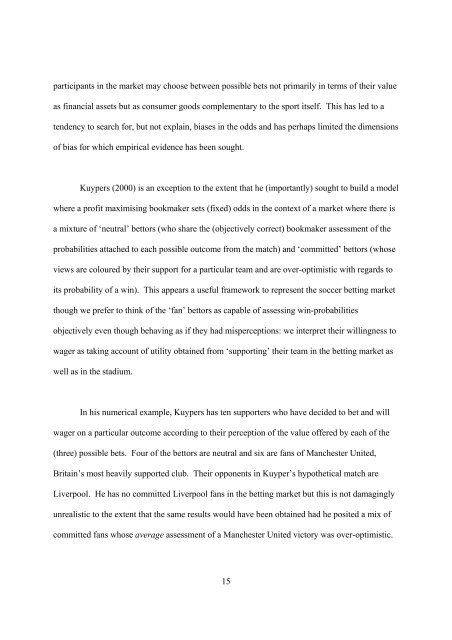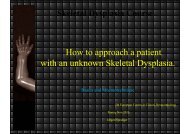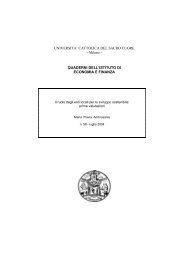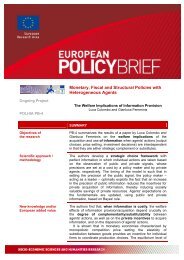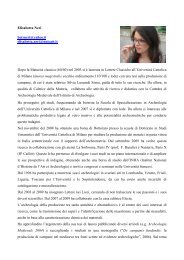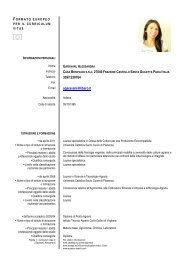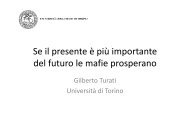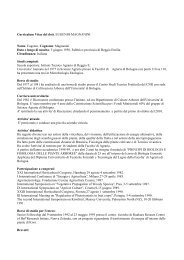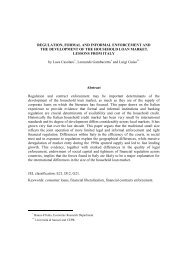Globalisation and Efficiency in the Fixed-odds Soccer Betting ... - Istituti
Globalisation and Efficiency in the Fixed-odds Soccer Betting ... - Istituti
Globalisation and Efficiency in the Fixed-odds Soccer Betting ... - Istituti
Create successful ePaper yourself
Turn your PDF publications into a flip-book with our unique Google optimized e-Paper software.
participants <strong>in</strong> <strong>the</strong> market may choose between possible bets not primarily <strong>in</strong> terms of <strong>the</strong>ir value<br />
as f<strong>in</strong>ancial assets but as consumer goods complementary to <strong>the</strong> sport itself. This has led to a<br />
tendency to search for, but not expla<strong>in</strong>, biases <strong>in</strong> <strong>the</strong> <strong>odds</strong> <strong>and</strong> has perhaps limited <strong>the</strong> dimensions<br />
of bias for which empirical evidence has been sought.<br />
Kuypers (2000) is an exception to <strong>the</strong> extent that he (importantly) sought to build a model<br />
where a profit maximis<strong>in</strong>g bookmaker sets (fixed) <strong>odds</strong> <strong>in</strong> <strong>the</strong> context of a market where <strong>the</strong>re is<br />
a mixture of ‘neutral’ bettors (who share <strong>the</strong> (objectively correct) bookmaker assessment of <strong>the</strong><br />
probabilities attached to each possible outcome from <strong>the</strong> match) <strong>and</strong> ‘committed’ bettors (whose<br />
views are coloured by <strong>the</strong>ir support for a particular team <strong>and</strong> are over-optimistic with regards to<br />
its probability of a w<strong>in</strong>). This appears a useful framework to represent <strong>the</strong> soccer bett<strong>in</strong>g market<br />
though we prefer to th<strong>in</strong>k of <strong>the</strong> ‘fan’ bettors as capable of assess<strong>in</strong>g w<strong>in</strong>-probabilities<br />
objectively even though behav<strong>in</strong>g as if <strong>the</strong>y had misperceptions: we <strong>in</strong>terpret <strong>the</strong>ir will<strong>in</strong>gness to<br />
wager as tak<strong>in</strong>g account of utility obta<strong>in</strong>ed from ‘support<strong>in</strong>g’ <strong>the</strong>ir team <strong>in</strong> <strong>the</strong> bett<strong>in</strong>g market as<br />
well as <strong>in</strong> <strong>the</strong> stadium.<br />
In his numerical example, Kuypers has ten supporters who have decided to bet <strong>and</strong> will<br />
wager on a particular outcome accord<strong>in</strong>g to <strong>the</strong>ir perception of <strong>the</strong> value offered by each of <strong>the</strong><br />
(three) possible bets. Four of <strong>the</strong> bettors are neutral <strong>and</strong> six are fans of Manchester United,<br />
Brita<strong>in</strong>’s most heavily supported club. Their opponents <strong>in</strong> Kuyper’s hypo<strong>the</strong>tical match are<br />
Liverpool. He has no committed Liverpool fans <strong>in</strong> <strong>the</strong> bett<strong>in</strong>g market but this is not damag<strong>in</strong>gly<br />
unrealistic to <strong>the</strong> extent that <strong>the</strong> same results would have been obta<strong>in</strong>ed had he posited a mix of<br />
committed fans whose average assessment of a Manchester United victory was over-optimistic.<br />
15


